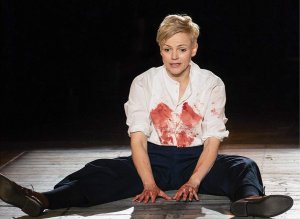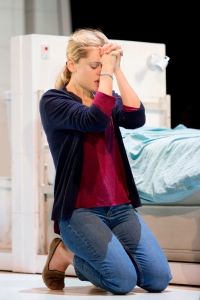but I committed to writing unnecessarily long blog posts a long time ago and there’s no turning back now.
*
I. peakes and valleys
I’ve never been to BAFTA before, it’s not somewhere I’ve had reason to go.
It turns out it’s a fairly nondescript door in a wall on Piccadilly, if you didn’t notice the sign above it reading BAFTA and flanked by two gold masks you’d never know. You have to buzz a button to get in. It reminds me of going to the dentist.
It’s slightly confusing, I’m going to a publicly advertised event, why the hell do I have to buzz in, surely there’s a couple of hundred people expected? It takes a while for the buzz to get acknowledge and in the wait several other people wait behind me. At least it’s not just me turned up, then.
The event (talk?) is Maxine Peake: A Life in Pictures. If the title alone didn’t sound vaguely posthumous the preset didn’t help. A sepia portrait of Peake that looks like it belongs on the front cover of a funeral order of service glows in the centre of the screen as we take our seats. I’ve ended up slap-bang in the middle, three rows back, just in front of the camera that’ll be filming the chat. The seat in front of me has apparently been endowed by Sir Elton John. I try not to make a joke and I wonder whether anybody bothered endowing my seat.
Anyway.
When Peake steps onto the stage, she has a bright red jacket draped over her shoulders which matches the bottoms of her heels. Somehow the jacket stays in its artfully arranged place as Peake gesticulates over the next couple of hours which I cannot help but be impressed by.
We start at the beginning: Peake talks about how comedy caught her interest first, largely because it seemed more realistic for a working-class northern girl “who looked like this” to be able to find work. Being an actress was not necessarily on the table, though she was in youth theatre groups wearing horrible carpet tops from Affleck’s palace and an African Awareness pendant.
The format of the talk is this: the interviewer, Miranda Sawyer, asks some questions generally related to a period of Peake’s career, designed to gently tug us towards one screen performance in particular, which we then see a clip of. We go chronologically from Dinnerladies through to Funny Cow, with stops at Room at the Top and Silk along the way.
Peake isn’t short of anecdotes. She talks about RADA, and how she ended up going their because she was awarded the Patricia Rothermere Scholarship – “Basically the Daily Mail paid for me to go to RADA. So it’s their fault. Basically every time they slag me off I go, well it’s your fault I’m here.” She talks about the influence of reading A Taste of Honey and Road as a teenager, and how after her roles in Dinnerladies and Shameless it was presumed she was plucked off the street and put on telly – as if she wasn’t acting. As if there was no craft in what she had been doing.
We see a little clip of Hamlet, which is the first time I’ve seen any of the film. I didn’t want to when it came out, I still had (have) the memory of it live stamped on the inside of my forehead. But it was interesting just to see those few seconds, Peake snarling and practically feral. It is how I remember it. Peake is wincing as she listens to the performance (she doesn’t turn around to watch the clips) and says that she commits every crime you shouldn’t do on screen – it’s a filmed theatre performance after all.
I think, as she talks, about how she is an actor who is brilliant with language, who I just want to listen talk because she has such a presence. But she is equally as compelling when she has virtually no dialogue, as we are reminded with the clip from her episode of Black Mirror (the stonkingly brilliant) Metalhead. I suppose both ideas, language and body, are just means to an end. She says, after grimacing through the Hamlet clip that actually “it doesn’t matter how much is going on as long as it’s truthful.”
She also talked about her Hamlet having Big Dick Energy.

II. those private little revolutions always die
I studied All My Sons at college for my IB English class. I seem to remember there were 8 of us in the class, few enough that we could all fit around one table in the classroom. I did not, much as I wanted to, escape the experience of having to read it out loud with the class. I remember I was given Chris to read, which at least gave me more to do than playing ‘The Moon’ in Blood Wedding did. I did not attempt an American accent.
I remember being distinctly ‘meh’ about it. Probably what happens when you have to read it out loud in class when no one really wants to do that. OH GOD and I just remembered that someone read the stage directions and actually said ‘pause’ out loud every time Miller wrote it and I cringed every time. Anyway. I also remember being surprised you could have a third act that was 12 pages long, that just seemed ridiculous to me.
Mostly I enjoyed doing drama in class because it meant I got to be an obnoxious shit and use words like Aristotelian, and it meant I got to read The Duchess of Malfi over and over again. I can still quote chunks of it, in fact I’m pretty sure I used a line of dialogue from it for an email password once.
ANYWAY.
That was 5 years ago, I guess. That feels like an age, I guess it is almost a quarter of my life ago. Walking through Waterloo station feels like another lifetime altogether – which is a ridiculous thing for someone my age to say, I know.
As I walk through I get handed a newspaper, well, an imitation of one. It’s part of the Imperial War Museum’s commemorations of the 75th anniversary of the D-Day Landings, which happens to be the next day. I think it’s a pretty good idea, actually. It’s a pretty decent resource, and mostly serves as an incentive to go further down the road and go to the museum proper.
And then you go to The Old Vic and see All My Sons and it ends up being one of those occasions when history tears through the theatre into the present. And I’m not talking about the way that house tracks downstage in the opening seconds. You don’t have to push the resonances of it too hard, it’s just there. You can feel it, walking down The Cut.
75 years is an actual lifetime.
I think about my Grandad, who landed at Gold Beach that day, and how the only photo I have of the two of us is him wearing his medals, and me wearing a tin-foil-and-Christmas-ribbon imitation. I think about the now-yellowed papers in the frame in my other Grandad’s hallway. One is a telegram that curtly informs my Great-great-grandmother of her son’s death. The other two are letters, one a follow-up from the telegram and the other informing her of another of her sons’ death. One is signed by the King, if I remember rightly. Or it looks like it was.
So I sit up in the gods of The Old Vic and I watch wartime loss tear this family apart, with words that I once got to say in a classroom in Warrington now being hurled about by Colin Morgan and they are devastating. I’m not sure I’d ever really clocked that it is probably Chris’ play: it might be Sally Field and Bill Pullman who get top billing but it’s really about Chris, it seems to me. And that third act may only be 12 pages but it’s completely brilliant. Completely brilliant in its – see, I was going to write mercilessness but that’s not right. It’s brutal, but… I don’t know. Maybe it is merciless. It’s certainly bleak.
Those final moments of Chris watching the house disappear back upstage, into the dark.

III. let’s all just have a drink
I’ve written before about People, Places and Things. I saw it before I started this blog but I wrote a retrospective piece about 2 years ago, because it really was – is – one of the defining theatrical experiences of my life.
I haven’t read it in over 3 years, not since my first year at uni. I seem to remember it was really cold in my room when I read it, which is really stupid in hindsight because that was the one time I wasn’t paying for bills separately. Should have used all the heating I could when I had the chance.
ANYWAY.
I was working my way through Duncan Macmillan’s first volume of collected plays – I’ve finally read Lungs, which I thought was stunning – and knew that eventually I’d get to it. Not sure I particularly wanted to, mind. But there it was, unavoidably at the back, bleeding through the pages towards me.
Reading it, when I ultimately get to it, is a lot like seeing it again. I still remember every inflection – or I remember enough of them. Or at least I think I do. It’s hard to not just picture that cast on that stage, but I start to manage it. I can see how it could be different.
The thing that hits me the hardest this time is the cyclical structure of the play, I hadn’t really noticed it before. Or probably hadn’t wanted to. The play starts with Emma crashing out onstage, mid performance, and it ends with her auditioning for a role and there’s absolutely nothing to suggest that she doesn’t do exactly the same thing again.
The idea that Emma is a pathological liar is not something that you can ignore, and yet, I don’t know. I felt like I’d been lied to? Those last moments of the play, of Emma doing that dreadful corporate monologue that somehow becomes one of the most brilliant things you’ve ever heard, they’re so dependent on the amount of optimism you can afford to project onto that character. If you’re willing to give it, it becomes a triumphant moment. She’s going to be better, maybe not okay, but better. If you’re not willing, or if you can’t, then it becomes the last and most tragic in a sequence of horrible things she does and lies she tells, and we go right back to the beginning. To be honest I actually found that realisation really quite upsetting. Which is a new one for me.
You’re stuck in her head for the whole play. Realities splinter into each other with Emma the only constant, and then even she seems to multiply. Every version of her exists simultaneously. I could probably follow this train of thinking and talk myself into saying there’s definitely at least one version of Emma that’s going to be okay but that feels like a copout. I think I probably have a more complicated relationship with this play than I tend to admit. It can be true that it’s one of the most brilliant things I’ve ever seen and it can also crystallise a sense of real, gut-turning foreboding in me.
Being in someone else’s head is not a particularly pleasant thing.
Photos by Johan Persson (All My Sons & People, Places and Things) and Jonathan Keenan (Hamlet)
